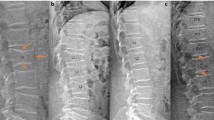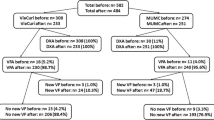Abstract
Summary
The utility of, and potential indications for, densitometric vertebral fracture assessment were evaluated in 1,168 men. A bimodal fracture distribution was observed, identifying fractures in 17% of men with no fracture history. Osteopenia or height loss of ≥ 2.5″ may be indications for VFA in men.
Introduction
Densitometric vertebral fracture assessment (VFA) is an excellent means to detect unappreciated vertebral fractures in women. However, little evaluation of VFA in men has been performed. This study evaluated VFA utility and explored potential VFA indications in men.
Methods
The study cohort consists of a population of 1,168 men (mean age, weight and BMI of 69.1 years, 188.8 pounds and 28.1 kg/m2, respectively) referred for clinically indicated bone mineral density (BMD) measurement at the Wm. S. Middleton VAMC. Lateral VFA images and scans of the lumbar spine, proximal femur and non-dominant radius, were obtained by two technologists using a GE Healthcare Lunar Prodigy densitometer. Vertebral fractures were defined using the Genant visual semi-quantitative approach.
Results
Seventy-eight percent of vertebrae from T4–L5 and 93% from T8–L5 were adequately visualized on VFA. Vertebral fractures were detected in 32% (374/1,168) of these men. A bimodal distribution was observed with fractures being most common in the mid-thoracic spine and at the thoraco-lumbar junction. As would be expected, the prevalence of VFA-detected fractures increased with age and as BMD declined. Fracture prevalence did not increase until a historical height loss of ≥ 6.4 cm (2.5 inches) was reported. VFA-identified fractures were present in 17% of men who had no history of fracture. Furthermore, in men with densitometric osteopenia, no historical fracture and absence of glucocorticoid use (n = 158), vertebral fractures were detected in 18%.
Conclusion
VFA allows evaluation of the majority of vertebral bodies in men and identifies a substantial number of individuals with previously unappreciated fracture. Additionally, a more stringent height loss requirement, perhaps 2.5 inches or more, or densitometric osteopenia (low bone mineral density by DXA), may be appropriate as indications for performance of VFA in men.





Similar content being viewed by others
References
Matthis C, Weber U, O’Neill TW, Raspe H, Group EVOS (1998) Health impact associated with vertebral deformities: results from the European Vertebral Osteoporosis Study (EVOS). Osteoporos Int 8:364–372
Lips P, Cooper C, Agnusdei D, Caulin F, Egger P, Johnell O, Kanis JA, Kellingray S, Leplege A, Liberman UA, McCloskey E, Minne H, Reeve J, Reginster J-Y, Scholz M, Todd C, de Vernejoul MC, Wiklund I (1999) Quality of life in patients with vertebral fractures: validation of the Quality of Life questionnaire of the European Foundation For Osteoporosis (QUALEFFO). Osteoporos Int 10:150–160
Oleksik A, Lips P, Dawson A, Minshall ME, Shen W, Cooper C, Kanis J (2000) Health-related quality of life in postmenopausal women with low BMD with or without prevalent vertebral fractures. J Bone Miner Res 15:1384–1392
Lips P, van Schoor NM (2005) Quality of life in patients with osteoporosis. Osteoporos Int 16:447–455
Adachi JD, Ioannidis G, Pickard L, Berger C, Prior JC, Joseph L, Hanley DA, Olszynski WP, Murray TM, Anastassiades T, Hopman W, Brown JP, Kirkland S, Joyce C, Papaioannou A, Poliquin S, Tenenhouse A, Papadimitropoulos EA (2003) The association between osteoporotic fractures and health-related quality of life as measured by the Health Utilities Index in the Canadian Multicentre Osteoporosis Study (CaMos). Osteoporos Int 14:895–904
Ross PD, Genant HK, Davis JW, Miller PD, Wasnich RD (1993) Predicting vertebral fracture incidence from prevalent fractures and bone density among non-black, osteoporotic women. Osteoporos Int 3:120–126
Black DM, Arden NK, Palermo L, Pearson J, Cummings SR (1999) Prevalent vertebral deformities predict hip fractures and new vertebral deformities but not wrist fractures. J Bone Miner Res 14:821–828
Melton LJ, Atkinson EJ, Cooper C, O’Fallon WM, Riggs BL (1999) Vertebral fractures predict subsequent fractures. Osteoporos Int 10:214–221
Lindsay R, Silverman S, Cooper C, Hanley DA, Barton I, Broy SB, Licata A, Benhamou L, Geusens P, Flowers K, Stracke H, Seeman E (2001) Risk of new vertebral fracture in the year following a fracture. JAMA 285:320–323
Cooper C, O’Neill T, Sillman A (1993) The epidemiology of vertebral fractures. European Vertebral Osteoporosis Study Group. Bone 14(Supplement 1):S89–S97
Greenspan SL, von Stetten E, Emond SK, Jones L, Parker RA (2001) Instant vertebral assessment: A noninvasive dual X-ray absorptiometry technique to avoid misclassification and clinical mismanagement of osteoporosis. J Clin Densitom 4:373–380
Schousboe JT, DeBold CR, Bowles C, Glickstein S, Rubino RK (2002) Prevalence of vertebral compression fracture deformity by X-ray absorptiometry of lateral thoracic and lumbar spines in a population referred for bone densitometry. J Clin Densitom 5:239–246
Vokes TJ, Dixon LB, Favus MJ (2003) Clinical utility of dual-energy vertebral assessment (DVA). Osteoporos Int 14:871–878
Vokes T, Bachman D, Baim S, Binkley N, Broy S, Ferrar L, Lewiecki EM, Richmond B, Schousboe J (2006) Vertebral Fracture Assessment: The 2005 ISCD Official Positions. J Clin Densitom 9:37–46
Schousboe JT, DeBold CR (2006) Reliability and accuracy of vertebral fracture assessment with densitometry compared to radiography in clinical practice. Osteoporos Int 17:281–289
Orwoll ES (2004) Treatment of osteoporosis in men. Calcif Tissue Int 72:114–119
Adler RA (2006) Epidemiology and pathophysiology of osteoporosis in men. Current Osteoporosis Reports 4:110–115
Samelson EJ, Hannan MT, Zhang Y, Genant HK, Felson DT, Kiel DP (2006) Incidence and risk factors for vertebral fracture in women and men: 25-year follow-up results from the population-based Framingham study. J Bone Miner Res 21:1207–1214
Kanis JA, Johnell O, Oden A, Borgstrom F, Johansson H, De Laet C, Jonsson B (2005) Intervention thresholds for osteoporosis in men and women: a study based on data from Sweden. Osteoporos Int 16:6–14
Vallarta-Ast N, Krueger D, Binkley N (2006) Addition of right lateral decubitus positioning improves vertebral visualization with VFA in selected patients. J Clin Densitom 9:375–379
Genant HK, Wu CY, Van Kuijk C, Nevitt MC (1993) Vertebral fracture assessment using a semiquantitative technique. J Bone Miner Res 8:1137–1148
Binkley N, Krueger D, Gagnon R, Genant HK, Drezner MK (2005) Lateral vertebral assessment: A valuable technique to detect clinically significant vertebral fractures. Osteoporos Int 16:1513–1518
Schuit SCE, van der Klift M, Weel AEAM, de Laet CEDH, Burger H, Seeman E, Hofman A, Uitterlinden AG, van Leeuwen JPTM, Pols HAP (2004) Fracture incidence and association with bone mineral density in elderly men and women: the Rotterdam study. Bone 34:195–202
Rea JA, Li J, Blake GM, Steiger P, Genant HK, Fogelman I (2000) Visual assessment of vertebral deformity by x-ray absorptiometry: A highly predictive method to exclude vertebral deformity. Osteoporos Int 11:660–668
Szulc P, Munoz F, Marchand F, Delmas PD (2001) Semiquantitative evaluation of prevalent vertebral deformities in men and their relationship with osteoporosis: The MINOS study. Osteoporos Int 12:302–310
Norgan NG, Cameron N (2000) The accuracy of body weight and height recall in middle-aged men. Int J Obes Relat Metab Disord 24:1695–1698
Author information
Authors and Affiliations
Corresponding author
Rights and permissions
About this article
Cite this article
Vallarta-Ast, N., Krueger, D., Wrase, C. et al. An evaluation of densitometric vertebral fracture assessment in men. Osteoporos Int 18, 1405–1410 (2007). https://doi.org/10.1007/s00198-007-0381-5
Received:
Accepted:
Published:
Issue Date:
DOI: https://doi.org/10.1007/s00198-007-0381-5




